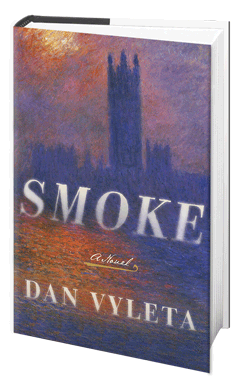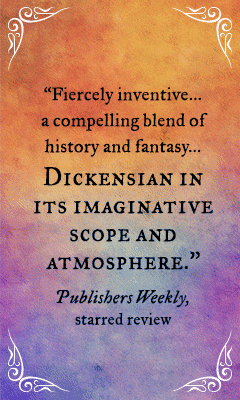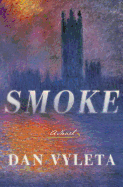Smoke
by Dan Vyleta
Smoke is set in England, "a century ago, give or take," a familiar yet strange land where, when the wicked lie, or sin in thought or deed, they release Smoke: thin, white wisps, or oily black and oozing, or yellow or green, depending on the crime. They might smoke through their mouths, or the pores of their skin. "One notices it at the shoulders first, and where the sweat has plastered the nightshirt to his skin: a black, viscous blot, no bigger than a penny. It's like he's bleeding ink. Then the first wisps of Smoke appear, stream from these dark little spots, leaving gritty Soot behind." It is a remarkably convenient way to judge people. Or so it seems.
With this premise, Dan Vyleta (The Crooked Maid) introduces a world of action, intrigue and challenge. Smoke opens in a boarding school for upper-class boys, where they are taught, using the stringent and often painful methods of Discipline, to smoke no more. It is fitting of their class that they show no flaws; being without Smoke or Soot marks one for the aristocracy, and it is taken for granted that the lower classes will "show": "[their] kind are meant to." And the teachers always know: when a boy smokes, it leaves Soot on his clothing, which can be removed only by intensive cleaning with lye. The stain is seen in the laundry, and this evidence results in a boy being called before the Master of Smoke and Ethics--or, worse, a tribunal.
Charlie and Thomas became friends upon their first meeting, when Thomas arrived at the school at a later age than most. Charlie is the golden boy who hardly ever releases Smoke; he has money and breeding, and everyone likes him. Thomas is mysterious, and not well-liked. His Smoke is not under control, and his history involves a shame better kept hidden. Julian, the head boy, seems determined to cut him low.
At Christmas, Charlie had thought to bring his new friend home to his estimable family estate for the holiday, but the orphaned Thomas gets a surprising invitation--or is it a summons?--from an uncle he hardly remembers. The headmaster pressures Charlie to accompany Thomas, and requests a report when they return: Charlie, apparently, is to spy on Thomas's family reunion.
All of this takes place in the first of six sections of Smoke, entitled "School." Charlie and Thomas remain fast friends, but they will confront many new and frightening realities, and enemies, and even meet newly discovered relations--some friend, some foe. Within just a few weeks, the two schoolboys are forced to reckon with more than a schoolyard bully and the standard methods of Discipline. A lovely young woman aspires to blamelessness: her mother scornfully calls her a nun and a prude. A madman is strapped to his bed. A lady challenges the very order of their world, calling into question the role and the value of Smoke itself, aiming to recruit the Soot of the most evil men and women for a mysterious purpose. And still the plot twists, thickens, roils--dark like Smoke. To pursue truth and good, the boys, now joined by a third companion, will have to venture into the darkest of places: London, a city of criminals, dim and choking with the evidence of their wrongdoing.
Smoke is many things: a fast-racing, heart-thumping adventure tale of good and evil paced with formidable momentum; a collection of lovely characterizations; a series of questions about children and adults, passion and reason, trust and corruption; a marvelous world of mind-bending unreality that simultaneously echoes our own; a philosophical puzzle and an entertaining whirlwind of a tale. Seemingly a plot-driven novel, it nevertheless poses existential problems: If one's Smoke is imperceptible, as in a coal mine, does one really smoke at all? Which is greater, emotion or rationality? And can one be human without Smoke?
Smoke is told from many perspectives, and as the plot continues to expand, the cast expands as well, eventually spanning social classes to include religious fanatics, compassionless scientists, imitators of virtue, good-hearted working-class misfits--and, possibly, the truly evil. Readers and characters are confronted with revelation after revelation, eventually including the very nature and meaning of Smoke. At a little over 400 pages, Smoke feels both longer and shorter than it is. It begs for a single-sitting read, such is the momentum of the plot. On the other hand, its world-building is so massive and engrossing that the experience feels much larger than a mere novel. Indeed, the scope of what began as a story of individual people and a fantastical premise swells into something both larger than life and intrinsic to life itself.
For moralists, or those who question them; for those pondering the difference between good and evil, or whether such a dichotomy even exists; and, especially, for readers who appreciate a wild and large-scale story of action, adventure, risk and destiny: Smoke will entertain and provoke thought. Thinking and feeling readers alike will be left wanting more. --Julia Jenkins, librarian and blogger at pagesofjulia








 Dan Vyleta
Dan Vyleta